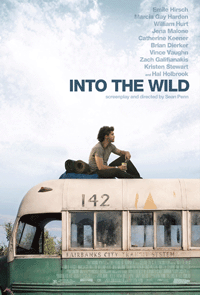The movie is every bit as good as the book, and has the added benefit of being able to show us the gorgeous scenery that McCandless himself experienced. In this way, his attraction to Alaska makes more sense. Penn’s film also more overtly presents Chris as a Christ figure, with shots of him ecstatically holding out his arms atop a mountain, and assuming that same pose as he floats naked down an icy river. Emile Hirsch, the actor who plays Chris, has said in interviews that he was close to hypothermia after that shot.)
The movie is also far more explicitly religious than was the book. One of the greatest, and simplest, scenes has the hungry McCandless biting into an apple, and saying, “You’re really good. You’re like a hundred, a thousand times better than any apple I’ve ever had. You’re a super apple. You’re so tasty. You’re so organic. So natural. The apple of my eye!” It’s a sneakily touching moment of gratitude and of prayer. And of real awareness. Later on, he befriends an elderly Catholic man, beautifully played by Hal Holbrook, who gives the young seeker some important lessons in the spiritual life. And towards the end of the film, when Chris struggles with starvation, he looks like nothing as much as the Giotto frescoes of Francis of Assisi.
McCandless is a complex figure, at once generous and selfish. He is adamant about always being kind, but also, in his desire to leave behind the “world,” he foolishly leaves behind a family who grieves for his loss. If McCandless, who reinvented himself as “Alexander Supertramp,” is a Christ figure, he’s a disarmingly human one.
The Jesuit with whom I saw the movie didn’t know the ending, and appreciated it all the more for that. So I won’t give it away here (even though it’s been widely reported). So far the reviews have been mixed: David Denby in The New Yorker panned it, but Scott Raab, in a profile of Penn in Esquire, called it “fearless, full-hearted beauty.” There’s a trailer available . I’m curious to know what others may have thought about this provocative story of adventure and discovery. So post your comments below.








